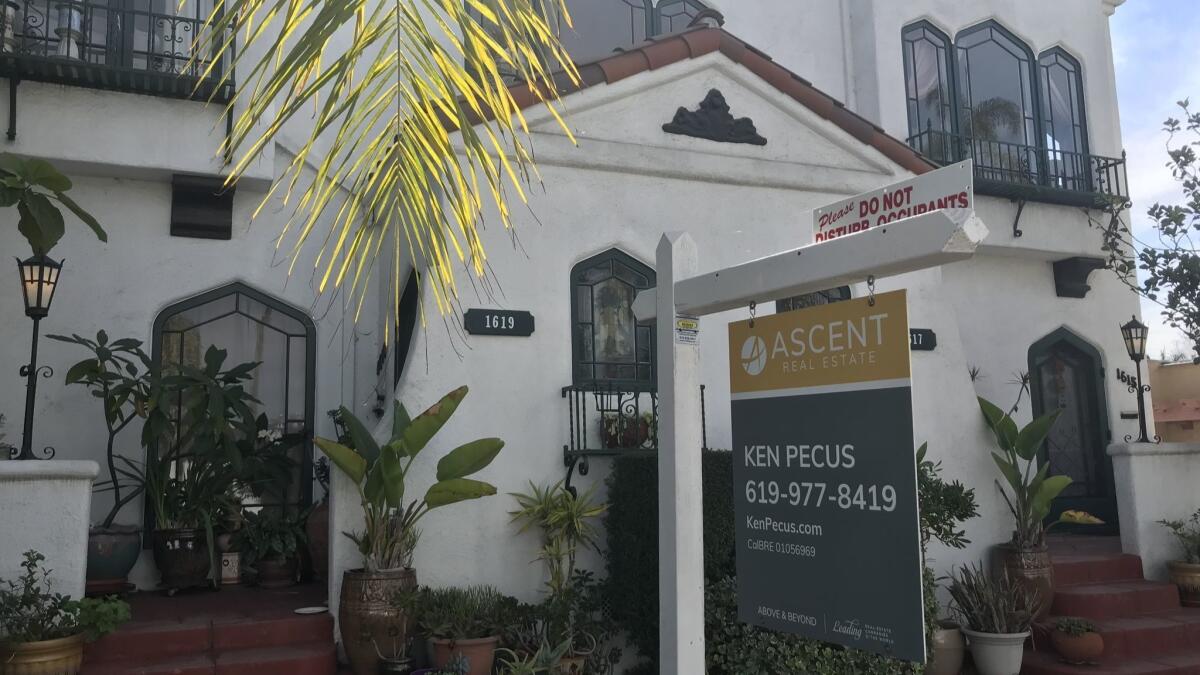Is the San Diego housing market more vulnerable than others?

San Diego County home sales, following a national trend, recently hit one of its lowest points in more than a decade. Also, housing website Trulia said 26.4 percent of listings in the San Diego metropolitan area had at least one price reduction in August, the most of the 100 metros studied.
Question: Do you think San Diego County's housing market is more vulnerable than other parts of the nation?
Phil Blair, Manpower
YES: Our prices are inflated by a very limited supply and very high demand. It all sounds good until there is a job slowdown and/or home mortgage rates continue to rise and fewer and fewer San Diegans are able to afford to buy a house. Our prices for comparable housing in the Midwest are so much higher that when there is a slowdown in the buyer market our home prices have much farther to fall.
Kelly Cunningham, San Diego Institute for Economic Research
YES: San Diego’s housing affordability ranking “sunk” to eighth lowest in the nation according to the latest (second quarter 2018) National Association of Home Builders report. Only 14.2 percent of homes sold in San Diego were affordable to median household income based on standard mortgage underwriting criteria. This is the lowest level since the fourth quarter of 2007, just before the last housing crash. Among the nation’s 20 least affordable metros for housing, 19 are in California.
David Ely, San Diego State University
NO: After years of rapid appreciation, home price increases are slowing due to higher mortgage rates and rising inventories. However, the economy is still healthy, local new home construction has been modest and lenders have been more cautious in extending credit. In this economic environment, some home sellers will need to adjust their expectations and lower their asking price. However, these conditions do not seem likely to lead to a market collapse.
Gina Champion-Cain, American National Investments
Not participating this week.
Alan Gin, University of San Diego
NO: The economy of San Diego is still very strong, with low unemployment and good job growth. That provides underlying strength to the housing market. One cause for the slowing real estate market is that prices have surged to levels that make it difficult for many people to buy houses. Prices may fall a little, but that would lead to buyers coming in as houses become more affordable. This provides a floor for housing prices and will prevent a steep crash.
James Hamilton, UC San Diego
YES: The two headwinds for the housing market are higher interest rates and the tax reform. San Diego is more vulnerable to both of these than other communities because many homeowners here need to take on bigger mortgages. That means a bigger hit when interest rates go up. The lowered deductibility of mortgage payments and local taxes also matters more for communities like San Diego where house prices and taxes are highest.
Gary London, London Moeder Advisors
NO: Our housing market will continue in a perpetual state of supply/demand imbalance, a result of the scarcity of land, over regulation and the dearth of new homebuilding opportunities. This props up San Diego and other West Coast housing markets. However, it appears that we have now entered “post peak” territory, which will impact both housing price increases and the pace of sales. Expect both to falter, especially as interest rates rise.
Norm Miller, University of San Diego
NO: It’s inappropriate to generalize our entire county market. Recent and future interest rate increases will impact the lowest half of our housing market by price tier where higher loan to value mortgages are required for purchase, i.e. South and East County. Stock market jitters affect the upper end the most, and these uncertainties have resulted in a market slow down. Average prices have not yet fallen, but could if interest rates continue to rise.
Jamie Moraga, IntelliSolutions
NO: Even with this decline, San Diego still has more demand for housing than we can supply. We can’t get enough homes on the market or have enough new homes built to meet this demand. San Diego and the state of California have a shortage of affordable housing. For example, our local military is having difficulty finding affordable homes for service members and their families in San Diego. The demand is here but the right supply is not.
Austin Neudecker, Rev
YES: From a layperson's perspective, the number of new, multi-tenant, urban properties seems to be increasing rapidly in San Diego. As the global trend towards urbanization continues, I am glad we are not solely relying on suburban sprawl, but also increasing urban density. Since a large number of new units are hitting the local market at the same time, I expected an impact on prices.
Bob Rauch, R.A. Rauch & Associates
NO: CAVE (citizens against virtually everything) will keep home prices up in San Diego. Taxes are high, mortgage rates up and construction costs continue to escalate. A lack of available land, a strong economy, rising wages and increasing numbers of millennials wanting to buy will keep prices up as well. Local governments don’t want further congestion, pollution, crime, higher taxes and perceived lifestyle destruction. Construction is growing but not enough to keep up with demand.
Lynn Reaser, Point Loma Nazarene University
NO: Two major factors are likely to make San Diego’s housing market less vulnerable. First, its economy is strong, with a jobless rate of just 3.2 percent versus a national 3.7 percent average. Second, regulatory and land constraints have restricted the addition of new supply. Between the beginning of 2017 and 2018, the county’s total housing stock increased by only about 8,500 units. Although appreciation is likely to slow, these forces should put a floor under the region’s home price levels.
John Sarkisian, Motion Ventures
NO: In the long run the lack of supply of new housing stock and the high costs to build against a diverse economy generating jobs will provide a floor for housing prices in San Diego. The current slow down is the result of increased interest rates and worries over the current political environment. This new environment will soon become the norm and buyers will once again emerge for houses in San Diego.
Chris Van Gorder, Scripps Health
NO: I think the recent slowdown has more to do with interest rates rising than any other factor which impacts home sales nationally, not just locally. This affects the ability of some buyers to purchase homes and qualify for home loans. The economy remains strong, wages are starting to rise, and there remains a supply and demand (shortage) of homes in San Diego.
Have an idea for an EconoMeter question? Email me at [email protected].
Follow me on Twitter: @PhillipMolnar
Sign up for Essential California
The most important California stories and recommendations in your inbox every morning.
You may occasionally receive promotional content from the Los Angeles Times.




